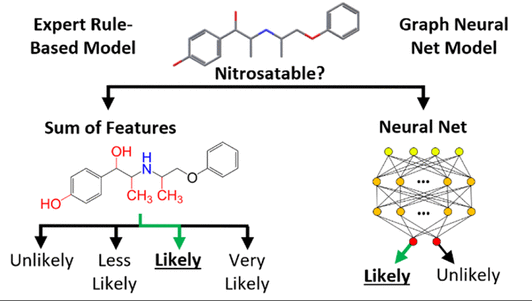I’m thrilled to announce our latest ‘open access’ publication on predicting the extent of compound nitrosation, leading to the formation of nitrosamines and NDSRIs. This research showcases the development and application of both statistical and expert rule-based prediction systems, along with a novel technique I’m calling “reaction-based read-across.”
https://doi.org/10.1021/acs.chemrestox.4c00435
Thanks @chakravarti_suman for sharing!
(Q)SAR Approaches to Predict the Extent of Nitrosation in Pharmaceutical Compounds
Abstract:
Since their discovery as impurities in numerous pharmaceuticals beginning in 2018, there has been a strong push to predict and prevent the formation of mutagenic nitrosamines. Several experimental methods, particularly the Nitrosation Assay Procedure, have been developed to predict a molecule’s susceptibility to nitrosation. Here, we have compiled the results of hundreds of these experiments from the literature to construct two structure–activity relationship models: a statistical model and an expert rule-based model. The statistical model has been built with graph neural networks and was trained on a dataset of 207 nitrogen-containing molecules. This model makes a binary call for each nitrogen center, predicting if it is likely to be nitrosated or not. Conversely, the rule-based model labels each possible nitrosamine product as one of four categories, ranging from “unlikely” to “very likely”. It makes this determination based on 15 rules, which cover 12 deactivating (inhibit nitrosation) and 3 activating (favor nitrosation) features that have been drawn from the literature. Both models perform remarkably well, with accuracies of ∼80%. The rule-based model is generally biased toward favoring nitrosation while the statistical model is more likely to classify an amine as un-nitrosatable due to the makeup of the dataset. Using the models together can balance these biases and further improve the reliability of both.
Thanks Naiffer. Hopefully it will be a useful source of information for the community.
It is quite an impressive work! It is certainly very useful!
Would you be willing to discuss the paper with our community members? I think some of the insights are so valuable to discuss among all of us…
Absolutely, thanks for your interest. Let me know what I will need to do to make the discussion going.
There is masses here to digest - congratulations on this.
Some of this information could be really, really useful in both the short and the long term, and I haven’t even read it all yet.
Dr. Krystle Reiss’s poster at SOT2025 has been published.
Constructing a Database of Nitrosation Reactions to Confirm and Expand (Q)SAR Model Predictions
